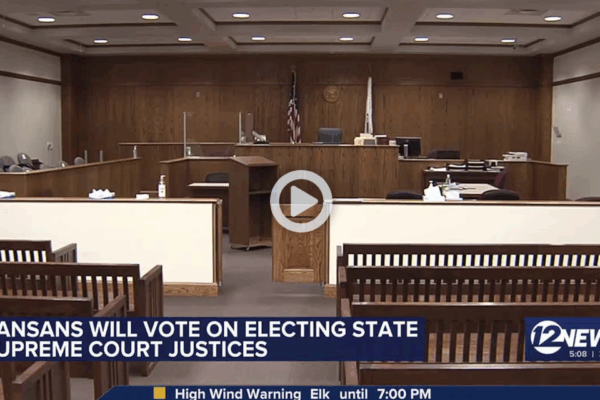WICHITA, Kan. (KWCH) - Following advancement from the Senate, the Kansas House of Representatives passed an amendment that would allow Kansans to decide on state Supreme Court justices. The amendment passed the House by a vote of 84-40 and now heads to the primary ballot next August.
If Kansas voters decide to adopt the amendment, it will allow Kansans to choose justices for six-year terms. Those would start in 2028.
Leaders in the Kansas House offered the following statement after Wednesday’s amendment passage.
“As we’ve traveled across Kansas listening to our communities, Kansans have told us they want to know more about who serves on Kansas’ highest court—a Supreme Court chosen by them, not handed down by an outdated, insider commission. SCR 1611 delivers just that, ending Kansas’ days as the only state with this system. This is the people’s victory, and we’re proud to stand with them as they reclaim their voice at the ballot box.”
Kansas Attorney General Kris Kobach also issued a statement in support of the measure referred to as a “judicial selection reform constitutional amendment.”
“Today marks an historic turning point in Kansas. Voters will now get to decide whether to reclaim the right to vote for justices, which they enjoyed from statehood until 1958,” Kobach said. “Polling shows that Kansans overwhelmingly prefer voting on Supreme Court Justices to the status quo. Seventy-four percent support the direct election of Supreme Court Justices, while only 20% like the current attorney-controlled system.”
A primary concern from the minority party in Kansas is that Supreme Court justices could be compromised with money influencing political campaigns.
In a statement opposing the amendment ACLU of Kansas Executive Director Micah Kubic called the push from Kansas Republicans “a blatant attack by the legislators on our justices [that is] part of a decades-long pattern of politicians attempting to punish the judicial branch for issuing decisions on education and reproductive freedom that they disagree with.”
“We are confident that, just as they did in 2022, the people of Kansas will see this attack for what it is – and once again take action to defend their constitutional rights from the power grabs of extremist politicians in Topeka,” Kubic said.
The Kansas Judicial Branch explains that in 1958, Kansans voted to add the merit-based nomination process for Supreme Court vacancies to the state constitution.
“The commission narrows the nominee pool to three names that it sends to the governor,” the Kansas Judicial Branch explained. “The governor chooses one nominee to appoint.”
The Supreme Court Nominating Commission has nine members, one lawyer and one nonlawyer from each of the state’s four congressional districts and one lawyer who serves as the chairperson.
Lawyers across Kansas elect the chairperson, the state explained. Regardless of the selection process, the state spells out eligibility requirements for Supreme Court nominees.
A Kansas Supreme Court nominee must be at least 30 years old and “a lawyer admitted to practice in Kansas and engaged in the practice of law for at least 10 years, whether as a lawyer, judge, or full-time teacher at an accredited law school.”
Copyright 2025 KWCH. All rights reserved. To report a correction or typo, please email [email protected]

